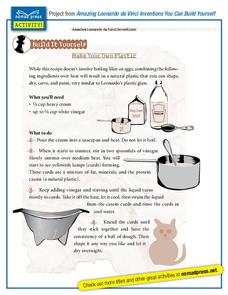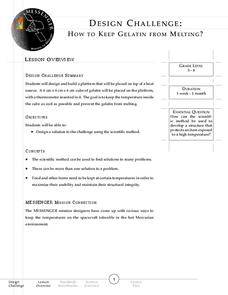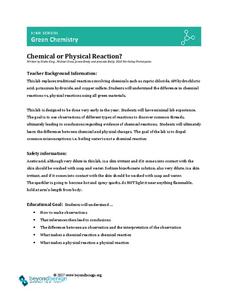Heat Conduction Teacher Resources
Find Heat Conduction lesson plans and worksheets
Showing 805 resources
Curated OER
Sources of Energy
Learners research various methods for preparing food and analyze energy sources. They explain that radiation, light, and heat are forms of energy used to cook food, treat diseases, and provide energy.
Curated OER
Heating
Students develop the idea that heat is a form of energy which moves from hot objects to cold ones.
Curated OER
How is Thermal Energy Transferred?
In this thermal energy worksheet, students will write down the key facts and vocabulary words associated with heat and thermal equilibrium, transfer of thermal energy, conductors and insulators, and heat capacity. This worksheet is a...
It's About Time
Exploring Energy Resource Concepts
Please turn off the lights to conserve energy. Or not, after all energy is always conserved. This first lesson in an eight-part series includes three parts. Part A contains one hands-on activity and two inquiry-based experiments on heat...
Urbana School District
Thermodynamics
Entropy, it isn't what it used to be. Presentation includes kinetic-molecular theory, heat and internal energy, thermal equilibrium, temperature scales, laws of thermodynamics, entropy, latent heat of fusion, specific heat, calorimetry,...
Virginia Department of Education
States of Matter
Scientists have been studying exothermic reactions before they were cool. The instructional activity begins with a discussion and a demonstration of heat curves. Scholars then determine the heat of fusion of ice and the...
Curated OER
Go With the Flow!
Pupils experiment with heat transfer in a countercurrent system and describe the importance of conduction in heat-energy transfer.
Curated OER
The Heat is On
Third graders experiment with heat through investigations. They rub objects together and compare the relative differences in the amount of heat given off. They write in their journals about the results they find.
Curated OER
Energy
Wow! Colorful and simple, these 160 slides introduce the various forms of energy, along with a relevant image. Some of the images are animations, which help beginning physical scientists to visualize the flow of electrons or energy! This...
It's About Time
Energy Flow in Ecosystems
Emerging biochemists more fully understand the flow of energy in ecosystems as they explore the laws of thermodynamics and relate them to energy transfer in food chains. They also investigate heat loss from the human body and how...
Nomad Press
Amazing Leonardo da Vinci Inventions: Make Your Own Plastic
When you hear Leonardo da Vinci mentioned, chances are that you think of the Mona Lisa, or flying machines—but what about plastic? Learners blend heavy cream and vinegar over heat to replicate da Vinci's early organic plastic recipe.
Virginia Department of Education
Metamorphic Rocks
Rocks can bend? Pupils investigate how heat and pressure produce metamorphic rocks by modeling them using clay, and then categorize samples based on observable characteristics. The lesson ends with a metamorphic rock identification...
Messenger Education
Design Challenge: How to Keep Gelatin from Melting
The inside of the spacecraft Messenger, which explores Mercury, will experience temperatures from 32 to 91 degrees Fahrenheit. In the final installment of a series of four space-related activities, groups spend time discussing and...
Crash Course
Electrical Power, Conductors, and Your Dream Home: Crash Course Engineering #21
Have young engineers always wondered how a light bulb works? Now's their chance. Viewers of an illuminating YouTube video learn about electric current, conductivity, and resistance. They see how engineers use low-conductivity conductors...
Climate Research Facility
Ocean Currents
Young scientists investigate the effects of heating a beaker of ice water by dropping dye into the water and observing how the color circulates.
Curated OER
Scientific Method Experiment: Factors Affecting How Ice Melts
Students demonstrate the scientific method by conducting an ice cube melting experiment. They make predictions and observations, and conclude what factors make ice melt more slowly or quickly than normal.
Beyond Benign
Chemical or Physical Reaction?
Ready to take your chemistry class on its first big lab adventure? Dive in to differentiation between chemical and physical changes with a thoughtfully designed set of experiments! Partners conduct a series of reactions, describe their...
Curated OER
IPC Physics
In this physics review worksheet, students compare inertia and momentum, insulators and conductors, and series and parallel circuits. Students review Newton's laws. This worksheet has 20 fill in the blank, 12 matching, and 20 problems to...
Curated OER
Sunlight and Warm Air
Pupils discuss radiant energy from the sun, performing a simple experiment with sun glasses and bright light to demonstrate the concept. Students further participate in simple in-class experiments to demonstrate: air density as it...
Curated OER
Energy from the Sun
In this energy worksheet, students conduct an experiment and observe the various ways in which heat energy can be transferred. They explain what happened to the wooden block when it was placed in direct sunlight. Students also explain...
Discovery Education
It's Melting!
It's a race to the finish! Which ice cube will melt the fastest? Scholars discover the effect thermal energy has on melting ice. They experiment with melting ice cubes on different materials and learn that even at a consistent...
California Academy of Science
The Heat is On: Cause and Effect and Climate
The higher the number of letters in the final word for the National Spelling Bee, the higher the number of people killed by venomous spiders. Obviously, those two facts correlate, but no causation exists. Scholars view data based on...
Fuse School
What Is The Natural Greenhouse Effect?
The Greenhouse Effect is a big part of why Earth is able to sustain life. But, how much is too much? In part two of an eight-part series about the carbon cycle, environmental scholars learn how the natural Greenhouse Effect keeps us warm...
Curated OER
Bing! Bang! Boom!
Sixth graders investigate heat energy, conduction, convection, and radiation.

























